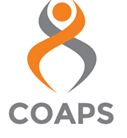Certified Older Adult Peer Specialists (COAPS)

The Certified Older Adult Peer Specialist (COAPS) program works nationally to address the unmet mental health needs of older adults. COAPS trains Certified Peer Specialists (CPS) to be older adult behavioral health specialists and wellness coaches. This specialized training prepares older adults in recovery to provide hope, empowerment, and support to others through shared experiences. Check out our webinar, hosted by the American Psychiatric Association on SAMHSA, to learn more about COAPS.
Peer support is recognized as an evidence-based practice in most behavioral health systems in the U.S, and many provide funding for these services. CPS also provide an economic benefit through expanded employment opportunities for individuals in recovery from mental and behavioral health disorders. The COAPS program continues to expand and flourish as it provides individual hope for recovery.
The specialized COAPS training is 18 hours, offered in person or remotely, and addresses topics such as normal aging, cultural responsiveness, and trauma. We also emphasize recovery-oriented support and motivational interviewing. COAPS are important partners in meeting the needs of older adults, as they are well-equipped to engage them in services, guide them through the recovery process, and help them navigate healthcare systems.

Are you interested in a COAPS training?
We typically work with organizations or large systems to offer COAPS training to their Certified Peer Specialists, rather than on an individual basis. If you are a CPS interested in becoming a COAPS, but are not working in a system currently offering training, please contact us to discuss options for organizing a group training (including associated costs).
Are you a COAPS Trainer leading an upcoming training?
If you have completed our Train-the-Trainer and plan to run a COAPS training, please complete this survey at least 2 weeks before your anticipated training date. We will then reach out to offer support and make sure you are updated on the latest COSPS guidelines and content.
Back to Top
